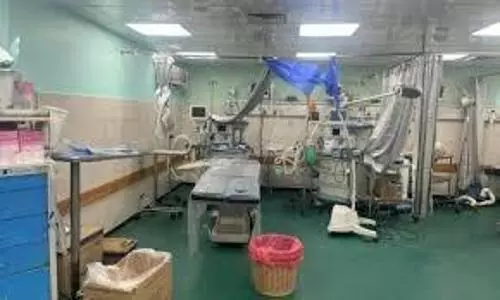
Is the country headed for starvation?
text_fieldsWhen the lockdown enters its 120th day, the fear of virus spread is getting compounded by growing apprehension about a serious food crisis. Although such a crisis was anticipated in the background of the declaration of lockdown with no prior planning and without giving the people sufficient time to prepare, the nosediving to starvation is happening at a more dreadful pace.
A recently released survey by the voluntary organisation, World Vision Asia-Pacific, also delineates the food crisis gripping the country. According to the survey conducted in 24 states and two union territories, 55 per cent of households in India have been reduced to two meals a day, a situation prevailing in the first 80 days of the lockdown. This also ratifies the World Bank report of last month that 1.25 crore people of India will fall into poverty due to Covid.
Within a few days after the announcement of lockdown, central food minister Ram Vilas Paswan had said there was a stock of food grains to last nine months and therefore the country would not have to starve. But if people have reduced their daily diet to two meals a day within four months of lockdown, the logical conclusion is that the reality is far removed from the government version. Both the survey result and World Bank report referred to above in effect challenge the claims made by prime minister Narendra Modi about Covid prevention at the recent UN ECOSOS (United Nations Economic and Social Council) conference. It is true that the lockdown was effective to a certain extent in checking the virus spread. But the more disturbing fact is that the Modi government was not able to foresee the hardship the people would be put to from lockdown or to seriously make any special packages to offer the required relief to the poor.
One need only to look Paswan's promise of ration distribution. He said that 81 crore people would be supplied with food grains. A fact that has come out by now is that in this country of 130 crore people, a large section of the population is out of the public distribution system network. The majority of the 'lockdown refugees' who were found at a loss all over the country during the lockdown, were people without any identify documents like Aadhar or ration card. It is this segment who are now forced to shrink their food intake for want of money and jobs. Thus lakhs of children are deprived of one meal a day. It is their fundamental right to basic needs like physical and mental health and education that is denied because of the entirely unscientific and unplanned government action. The food and economic crisis that is experienced in the country now, was not resulting from Covid alone. Even prior that, the country had been in severe economic crisis. And it is during the last three years that the country recorded its worst levels of job losses in the last four decades.
If any one asks why it happened so, the Modi government was a total failure as much in Covid prevention as in economic planning too. What landed the country in a state of economic crisis are the economic reform policies like the note-ban and introduction of GST, and the unscientific and impractical development schemes, baked by Niti Ayog. This was not the state of affairs ten years ago. During 2005-15 the country was able to pull 27 crore people out of poverty, as per a report by Oxford Poverty and Human Development Initiative. The report also mentions that the schemes introduced by UPA-1 and UPA-2 governments like employment guarantee and food security schemes, accelerated poverty eradication drives.
It was the efficacy of planning that marked the government of that era which enabled the country to overcome the economic crisis that had plagued the entire world ten years ago. Although that government took considerable blame for big corruption, it did not venture on absurd reforms that would endanger the entire country. Now things have taken a reverse turn. Thus, dipping further and further in the global poverty index India's rank has slipped below to 102, lower than Nepal and Pakistan.
The bottomline of the statistics and the cited reports is that none of the economic packages introduced either at the time of slapping the lockdown, or when it was extended several times, was adequate to address the crisis that arose from them. They also point a finger at the need for further stimulus packages in order to save the country from slipping into starvation in future. This is an issue that impinges on the fundamental right to life of the weaker sections that number 22 crore. The critical question at this hour is whether the Centre will be prepared to listen to their clamour for one square meal.

















